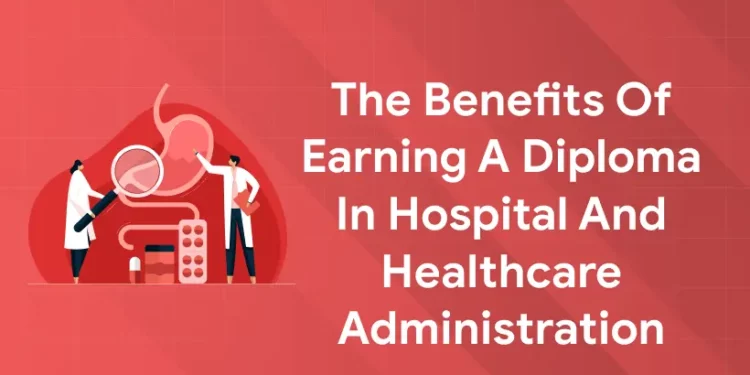Table of Contents
Introduction
A post-graduate diploma in hospital and healthcare administration is something you should pursue if you are serious about developing a career in healthcare and management. You’ll have the best employment opportunity because of it. You can contribute your expertise and in-depth understanding of this field with this programme. This sector is expanding quickly, changing, and developing. Gaining a postgraduate diploma in hospital management will improve your abilities and increase your appeal as a candidate for this course of study. In order to prepare them to handle challenging situations in the healthcare environment and enhance patient outcomes, students obtain information in patient care, leadership, quality improvement, and healthcare trends.
Join Entri’s Hospital and Healthcare Administrator Course
What Makes Healthcare Administration Important?
1: What is the primary role of a hospital administrator?
It would not be overstating the case to suggest that the healthcare sector would not exist (at least not in the shape we know it to) if enthusiastic healthcare administration experts were not at the helm. They are the ones that make sure that patients, insurance companies, and medical professionals can all access the vital information required to provide the highest quality of care. Potentially life-saving therapies would frequently be postponed in the absence of healthcare management personnel. In a complex system, payments would be misplaced and patient treatment would be of lower overall quality.
Hospital Administration Course with Assured Career Growth
Hospital Administration Course by Entri App: Master essential healthcare management skills, gain certification, and secure top roles in leading hospitals
Join Now!Benefits of Earning a Diploma in Hospital and Healthcare Administration
Everyone can benefit from healthcare administration, and obtaining a diploma in this area has personal advantages for you as well. These advantages include, but are by no means restricted to, the following kinds of advantages.
Building and Managing Relationships
A patient’s successful treatment outcome is not the result of a vacuum. It is almost always the result of individuals uniting and collaborating to operate more effectively as a team than they could separately. That requires deeply ingrained, enduring ties. Often through the same kinds of activities meant to foster leadership abilities, healthcare administrators play a significant role in fostering such partnerships.
Building Your Leadership Capabilities
The development of leadership abilities in healthcare personnel is greatly aided by healthcare administrators. Healthcare administration departments provide a variety of leadership training programmes that might be beneficial to individuals who are not naturally gifted leaders. Healthcare administrators promote the very programmes that enable everyone to enhance their communication, decision-making, and problem-solving skills—from physicians and nurses to techs and support personnel. They are also essential in promoting team-building exercises that refine staff members’ cooperation and teamwork skills as well as mentorship programmes that let seasoned leaders coach and mould newcomers to the healthcare team.
Resolving Conflicts
There will always be conflict of some kind going on in a healthcare setting. Insurance providers will reject claims that require an appeal. Organisational changes will not sit well with healthcare professionals. There will be disagreements between patients and carers. It becomes essential for healthcare administrators to resolve these issues in a reasonable manner without escalation, not to mention in your daily life.
Excellent Interaction Skills
Collaboration is key to the healthcare industry, and effective communication is a foundational element of that. Every day, as a healthcare administrator, you will contribute to the improvement of communication skills between patients, insurance companies, third-party providers, and healthcare professionals.
Join Entri’s Hospital and Healthcare Administrator Course
Ability to Train and Be a Mentor
The chance to train and guide others is a significant benefit of pursuing a career in healthcare management. You will eventually have the opportunity to impart your wisdom and experience to others in a way that will have a lasting effect. You have the ability to uplift others and support them when they need it. It’s just another illustration of how, in the end, assisting as many people as you can is the main goal of any profession in healthcare, albeit in this case, in an administrative role.
Ability to Form and Maintain Decisions
It’s never simple to make a decision in the face of uncertainty, but this is particularly true in a setting with as much at stake as healthcare. This is valid even for jobs like healthcare administration that don’t include direct patient care. Fortunately, you will be well-prepared by your training for the position to handle pressure and make thoughtful, well-informed decisions. When there are situations where there is no “right answer,” you must have the courage to choose a course of action and stay with it. This is a skill that competent healthcare administrators regularly acquire.
Task Delegation
Your ability to assign the correct assignment to the right person at the right time is crucial to your success in any administrative role and, by extension, the success of the company. It’s essential to project management in general and to leading a successful team in particular. In order to enhance patient care and results, hospital administrators assist with this on a regular basis.
Operational Awareness and Strategy
Operational awareness, sometimes called situational awareness or strategy, is the capacity to identify an action or occurrence for what it is and to understand how it fits into a larger context. Everybody has a part to play in a healthcare organization’s success, and understanding how the various components work together helps make sure that everyone is on the same page.
Emotional Intelligence
Since the healthcare industry is essentially emotional, emotional intelligence is essential. Having a career in healthcare administration will enable you to interact with people on a rationale and supportive level, in addition to seeing and evaluating their emotions.
Soft Skills and Important Traits
The soft skills that students might acquire while obtaining their healthcare administration degree are just as significant. Soft talents are those crucial characteristics that enable effective interpersonal communication. Considering how highly collaborative healthcare management is, it’s understandable why this is so essential to one’s success.
Flexible Employment Outside of Healthcare
Skills like conflict resolution, effective interpersonal communication and teamwork, and captivating leadership are highly valued in almost any field. This also applies to your capacity for work delegation, operational strategy development and adherence, and even emotional intelligence. Because of this, no matter what kind of role or industry you choose to follow in the future, the skills you acquire in a healthcare administration environment can keep you competitive.
Empathy and Self-awareness
The greater your self-awareness with regards to your feelings, the more compassion you will possess for other individuals. This is one of the most rewarding and demanding aspects of working in the healthcare industry. Occasionally, you may have to break unpleasant news or make tough choices that don’t turn out the way you had hoped. As is true in many professions, empathy and self-awareness can help make things better for everyone when hard times arise.
Practical Knowledge Outside of Healthcare
One of the main advantages of healthcare administration is the practical expertise you gain along the route, which is useful if you decide to change careers later on. Beyond the practical experience you gain from your work, think about the wide range of subjects your education will cover. Studying for a Master of Healthcare Administration degree will need you to attend classes in project management, ethics, law, marketing, finance, and more. Not only will you be broadly knowledgeable about these perennially relevant subjects, but you will also possess the knowledge and skills required to make a significant contribution to any company you may choose to work for.
| Also Read |
Comprehensive Healthcare Knowledge
All things considered, one of the main advantages of studying healthcare management is the extensive knowledge you gain about the whole industry. Numerous healthcare workers have specialisations by design. The majority of people have a narrow concentration that doesn’t go much beyond a fairly strict definition. Conversely, administrators in the healthcare field are involved in almost every facet of the business. They work closely with physicians, nurses, and other health care providers. They have direct dealings with insurance providers. They converse with patients. They need to be proficient in managing a business, medical billing, and other areas.
Increased Involvement and Responsibility
Referring back to one of the previously cited facts, it’s critical to remember that a large portion of the populace in this nation believes that there are serious problems within the healthcare sector. It’s very likely that you or someone you know is one of them. Another advantage of working in healthcare administration is that you have more responsibility and the chance to effect significant systemic changes because you are so deeply involved in the day-to-day operations of these organisations. Healthcare managers frequently take a proactive role in an organization’s employment process. They frequently assist with creating and adhering to budgets as well as other financial concerns. They have a unique opportunity to observe how everything functions and comes together. This implies that they have a special opportunity to bring about long-lasting organisational change that will help a great deal of other people. There aren’t many positions that offer you that much power to truly impact change.
Entri’s Hospital Administration Course
- Duration & Format: 8-month diploma combining 4 months of online training, 3 months on-the-job training through hospital internships, and 1 month of revision and model exams.
- Comprehensive Curriculum: Covers clinical management, hospital software training, healthcare IT systems, leadership, communication, financial and human resource management, legal and regulatory knowledge.
- Expert Trainers: Industry professionals with over 10 years of experience deliver live sessions, practical workshops, and provide interview and profile building support.
- Additional Training: Includes Basic Life Support (BLS), spoken English, and management skills enhancement.
- Placement Assistance: Dedicated support for job placements with successful alumni working in top hospitals like Amrita Hospital Kochi and Atlas Eye Hospital.
- Career Roles: Prepares students for diverse roles including hospital administrator, front office, billing, insurance processing, and public relations.
- Learning Support: Free study materials, live interactive sessions, mentor guidance, and doubt-clearing classes throughout the course to ensure strong learning outcomes.
Conclusion
Earning a diploma in Hospital and Healthcare Administration through Entri’s expert-led course offers a pathway to a rewarding career in one of today’s fastest-growing sectors. With an up-to-date curriculum, practical training, and robust placement support, students are equipped not only to excel in healthcare management but also to drive innovation and efficiency in healthcare systems. Whether you are a career starter or a professional looking to upskill, this course prepares you to meet the dynamic challenges of modern healthcare administration and make a meaningful impact on patient care and hospital operations. Take the first step toward a promising future by enrolling in Entri’s Hospital Administration course today.
| Also Read | |
| How to Become a Hospital Administrator | |
| Top Skills Needed for a Successful Career in Hospital Administration | |
| Career Pathways in Hospital and Healthcare Administration |
Hospital Administration Course with Assured Career Growth
Hospital Administration Course by Entri App: Master essential healthcare management skills, gain certification, and secure top roles in leading hospitals
Join Now!Frequently Asked Questions
Which course is best for hospital administration?
Among the most well-liked hospital management courses are MBA Hospital Management, BBA Hospital Management, and MBA Healthcare Management.
What is the highest position in hospital administration?
In a hospital or hospital system, the Chief Executive Officer (CEO) is the highest ranking managerial job. CEOs of hospitals need to be qualified and skilled in order to oversee and manage the intricacies of a contemporary patient care facility.
What is the highest degree in healthcare administration?
DHA holders, who hold the highest degree in healthcare administration, frequently go on to assume administrative or leadership positions. You have a choice between a doctor of philosophy (Ph. D.) and a doctor of health administration (DHA).














